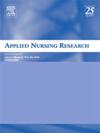重症监护病房的声音:家庭成员与护士沟通的质性研究
IF 2.7
4区 医学
Q1 NURSING
引用次数: 0
摘要
ICU护士与患者家属之间的有效沟通对于确保最佳护理、减少焦虑和提高决策能力至关重要。然而,在全球范围内,沟通困难仍然存在,特别是在重症监护病房(icu),那里的病人情况危急,他们的家人感到痛苦。目的探讨约旦ICU护士及其家属的生活经历,了解护士工作量、情绪压力和文化期望如何影响重症监护环境中沟通的质量、清晰度和情绪基调。研究设计采用定性探索性设计。对约旦两所三级医院的15名重症监护室护士和15名家属进行了面对面的半结构化访谈。Braun和Clark的主位分析被用来生成主位和副位。结果研究确定了三个主要主题:(1)沟通脱节和信息缺口,包括不同班次的信息更新不足或不一致;(2)情绪负荷及其对沟通的影响,由家庭情绪负荷和护士倦怠驱动;(3)平衡家庭需求和护士工作量,包括频繁更新、透明度、情感支持和专业界限之间的紧张关系。结论约旦医院ICU护士与家属沟通存在障碍,主要原因是信息分布不规律、家庭内部情绪动荡、护士身心疲惫。这些问题与时间压力和工作量压力重叠,造成信息流的空白,信任的侵蚀和情绪的过载。通过改善ICU结构,简化沟通途径,加强护士教育和支持,提高家庭满意度,可以改善家庭体验。本文章由计算机程序翻译,如有差异,请以英文原文为准。
Voices from the intensive care unit: A qualitative study on communication between family members and nurses
Background
Effective communication between ICU nurses and patients' families is essential in ensuring optimal care, reducing anxiety, and enhancing decision-making. However, communication difficulties persist globally, particularly in intensive care units (ICUs) where patients are in critical condition and their families are distressed.
Aim
To explore the lived experiences of ICU nurses and family members in Jordan to understand how nurse workload, emotional stress, and cultural expectations influence the quality, clarity, and emotional tone of communication in intensive care settings.
Study design
A qualitative exploratory design was used. Individual face-to-face semi-structured interviews were done with 15 ICU nurses and 15 family members in two tertiary hospitals in Jordan. Braun and Clark's thematic analysis was utilized to generate the main themes and subthemes.
Results
The study identified three major themes: (1) communication disconnect and information gaps, including inadequate or inconsistent updates across shifts; (2) emotional load and its impact on communication, driven by family emotional overload and nurse burnout; and (3) balancing families' needs with nurses' workload, involving tensions between frequent updates, transparency, emotional support, and professional boundaries.
Conclusions
The study shows that ICU nurses in Jordanian hospitals face barriers to communicating with family members owing to irregular information distribution, emotional turmoil within families, and nurse exhaustion. These problems overlap with time pressure and workload stress, creating gaps in information flow, trust erosion, and emotional overload. Families' experiences could be improved through an improved ICU structure, easier communication pathways, enhanced nurse education and support, and improved family satisfaction.
求助全文
通过发布文献求助,成功后即可免费获取论文全文。
去求助
来源期刊

Applied Nursing Research
医学-护理
CiteScore
4.50
自引率
0.00%
发文量
65
审稿时长
70 days
期刊介绍:
Applied Nursing Research presents original, peer-reviewed research findings clearly and directly for clinical applications in all nursing specialties. Regular features include "Ask the Experts," research briefs, clinical methods, book reviews, news and announcements, and an editorial section. Applied Nursing Research covers such areas as pain management, patient education, discharge planning, nursing diagnosis, job stress in nursing, nursing influence on length of hospital stay, and nurse/physician collaboration.
 求助内容:
求助内容: 应助结果提醒方式:
应助结果提醒方式:


